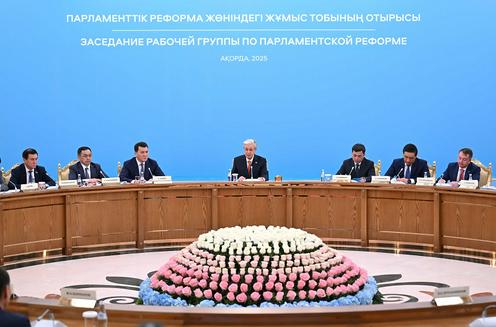Implementing the parliamentary reform proposed by Kazakhstan’s President Kassym-Jomart Tokayev will require sweeping constitutional changes, the president said at the first meeting of the working group on parliamentary reform, according to the presidential press service Akorda.
“The amendments will affect about 40 articles of the Constitution. After that, at least 10 constitutional laws and more than 50 codes and statutes will have to be brought into alignment. This process is, in essence, comparable to adopting a new Constitution. Clearly, it will be impossible to complete this entire scope of work all at once. Careful preparation is needed,” Tokayev said.
In his annual address to the nation last month, Tokayev proposed replacing the current bicameral parliament — composed of the Mazhilis (lower house) and the Senate (upper house, which is to be abolished) — with a single-chamber legislature. The president stated that the proposal should be put to a national referendum, which could take place in 2027.
At today’s meeting, Tokayev stressed that it would be “entirely incorrect to reduce parliamentary reform to merely the dissolution of the Senate.” “Our clear objective,” he said, “is to carry out a profound transformation of the entire representative branch of government.”
The president also noted that the reform aligns with broader transformations in other areas of national life, including the digitization of public administration. According to Tokayev, “the transition to a unicameral parliament is also intended to adapt to the new substance and pace of work, to the faster rhythm of decision-making.” The focus, he added, will be on mechanisms allowing citizens to participate in political life through an “electronic parliament” (e-Parlament), similar to the existing “electronic government” (e-Gov) system.
Tokayev described the planned reform as part of Kazakhstan’s broader political modernization. Earlier reforms introduced the concept of a parliamentary opposition, granting minority parties the chairmanship of one standing committee in the Mazhilis and the right to initiate parliamentary hearings. The electoral threshold for parties to enter parliament was also lowered.
“Then, through the 2022 constitutional reform, we significantly expanded the powers of the Mazhilis. Today, the Mazhilis passes laws while the Senate approves them. Those were the first steps. Now, given the increased level of political culture in society in recent years, we are moving forward — deliberately and consistently — toward a unicameral parliament,” the president concluded.
Kazakhstan’s working group on parliamentary reform was established on October 8. It is chaired by State Counselor Erlan Karin, with presidential aides Yerzhan Zhiembayev and Arman Kyrykbayev serving as his deputies. The 30-member group includes prominent lawyers, legislators, political scientists, and public figures.










